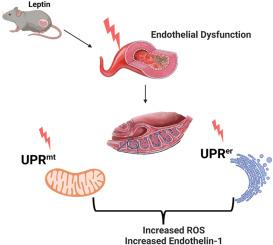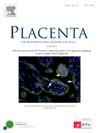Mid-late gestation leptin infusion induces placental mitochondrial and endoplasmic reticulum unfolded protein responses in a mouse model of preeclampsia
IF 3
2区 医学
Q2 DEVELOPMENTAL BIOLOGY
引用次数: 0
Abstract
Introduction
Preeclamptic patients, both lean and obese, present with elevated leptin levels which are associated with the development of maternal endothelial dysfunction and adverse fetal outcomes, such as growth restriction, leading to low birth weight. Recent studies in pregnant mice demonstrate that mid-late gestation leptin infusion induces clinical characteristics of preeclampsia, including elevated maternal blood pressure, maternal endothelial dysfunction and fetal growth restriction. However, whether leptin triggers placental stress responses that contribute to adverse fetal outcomes as in preeclampsia is unknown.
Methods
In the current study we measured the expression of proteins involved in the endoplasmic reticulum (UPRer) and mitochondrial (UPRmt) unfolded protein responses in placentas of wild-type sham normal pregnant and leptin-infused preeclamptic mice.
Results
The data show that mid-late gestation leptin infusion induced activation of indices of placental UPRer and UPRmt, while reducing placental repair mechanisms to UPRmt in preeclamptic mice. Mid-late gestation infusion with leptin upregulated markers of placental oxidative stress, reduced the placental expression levels of mitochondrial electron transport chain complexes I and II and increased the expression of placental endothelin-1 (ET-1) in preeclamptic mice. The leptin-induced activation of several placental UPRmt markers as well as ET-1 levels correlated with fetal growth restriction and impaired maternal endothelial function in preeclamptic mice.
Discussion
Collectively, these data indicate that elevated levels of leptin in mid-late pregnancy in mice promote placental stress responses, akin to those in pregnant women with preeclampsia.

在子痫前期小鼠模型中,妊娠中晚期注射瘦素可诱导胎盘线粒体和内质网折叠蛋白反应。
导言:先兆子痫患者,包括瘦人和肥胖者,都会出现瘦素水平升高,这与母体内皮功能障碍和胎儿不良结局(如生长受限)的发生有关,从而导致出生体重不足。最近对怀孕小鼠的研究表明,妊娠中晚期注射瘦素可诱发子痫前期的临床特征,包括母体血压升高、母体内皮功能障碍和胎儿生长受限。然而,瘦素是否会引发胎盘应激反应,从而导致与子痫前期一样的不良胎儿结局,目前尚不清楚:在本研究中,我们测量了野生型假正常妊娠小鼠和注入瘦素的子痫前期小鼠胎盘中参与内质网(UPRer)和线粒体(UPRmt)未折叠蛋白反应的蛋白质的表达:数据显示,妊娠中晚期输注瘦素可诱导激活胎盘UPRer和UPRmt指数,同时降低子痫前期小鼠胎盘对UPRmt的修复机制。妊娠中晚期输注瘦素可上调胎盘氧化应激指标,降低胎盘线粒体电子传递链复合物I和II的表达水平,并增加子痫前期小鼠胎盘内皮素-1(ET-1)的表达。瘦素诱导的胎盘UPRmt标记物和ET-1水平的激活与胎儿生长受限和先兆子痫小鼠母体内皮功能受损相关:总之,这些数据表明,小鼠妊娠中晚期瘦素水平升高会促进胎盘应激反应,这与子痫前期孕妇的应激反应类似。
本文章由计算机程序翻译,如有差异,请以英文原文为准。
求助全文
约1分钟内获得全文
求助全文
来源期刊

Placenta
医学-发育生物学
CiteScore
6.30
自引率
10.50%
发文量
391
审稿时长
78 days
期刊介绍:
Placenta publishes high-quality original articles and invited topical reviews on all aspects of human and animal placentation, and the interactions between the mother, the placenta and fetal development. Topics covered include evolution, development, genetics and epigenetics, stem cells, metabolism, transport, immunology, pathology, pharmacology, cell and molecular biology, and developmental programming. The Editors welcome studies on implantation and the endometrium, comparative placentation, the uterine and umbilical circulations, the relationship between fetal and placental development, clinical aspects of altered placental development or function, the placental membranes, the influence of paternal factors on placental development or function, and the assessment of biomarkers of placental disorders.
 求助内容:
求助内容: 应助结果提醒方式:
应助结果提醒方式:


